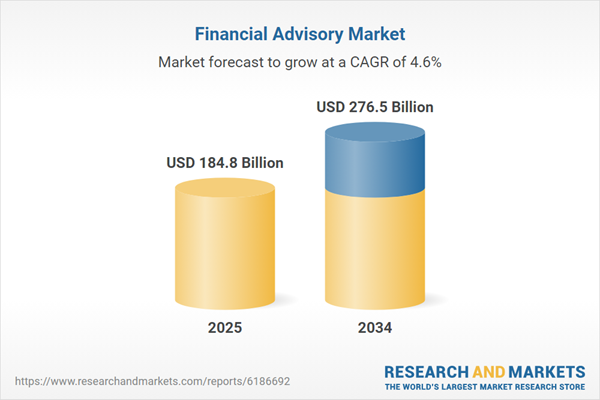The financial advisory market is witnessing steady growth, driven by rising demand for wealth management, investment guidance, and strategic financial planning services. With increasing financial complexities, individuals and businesses are seeking expert advisors to navigate investment opportunities, tax strategies, estate planning, and risk management. The rise of digital platforms and fintech solutions has further transformed financial advisory services, making them more accessible and data-driven. High-net-worth individuals (HNWIs) and institutional investors are particularly driving demand for customized financial solutions, while small and medium-sized enterprises (SMEs) rely on advisory firms for business expansion, mergers, and capital allocation. Additionally, regulatory changes and evolving financial landscapes are prompting businesses and individuals to seek compliance-focused advisory services. As economic uncertainties persist, financial advisors are playing a crucial role in helping clients build resilient financial strategies, ensuring stability and long-term wealth accumulation.
The financial advisory market is undergoing rapid transformation, with technology playing a key role in reshaping advisory services. The integration of artificial intelligence (AI) and robo-advisory platforms is enhancing personalized investment strategies, offering cost-effective financial planning solutions. The growing emphasis on sustainable investing and ESG (Environmental, Social, and Governance) compliance is prompting financial advisors to incorporate ethical investment portfolios into their services. Additionally, rising inflation and interest rate fluctuations have led to increased demand for financial risk assessment and portfolio diversification strategies. Many financial advisory firms are expanding their services to cater to digital-native clients by leveraging hybrid advisory models that combine human expertise with AI-driven insights. Regulatory changes, such as new tax laws and investment compliance standards, are also influencing financial advisory practices, requiring firms to stay agile and well-informed. As the global economy stabilizes post-pandemic, financial advisors are focusing on long-term wealth-building strategies, catering to an increasingly diverse client base.
The financial advisory market is expected to see further evolution with deeper integration of advanced technologies. AI-driven predictive analytics and blockchain-based financial planning tools will enhance security, transparency, and automation in wealth management. The growing interest in digital assets and cryptocurrency investments will drive financial advisors to develop expertise in blockchain finance and decentralized investment strategies. Additionally, succession planning and estate management will gain prominence as an aging population seeks structured wealth transfer solutions. Regulatory developments will continue to shape the industry, with stricter compliance measures ensuring investor protection and ethical financial practices. Personalized financial advisory services will become more sophisticated, utilizing big data and behavioral finance insights to tailor investment strategies to individual preferences and risk appetites. As global markets continue to evolve, financial advisors will play a crucial role in helping clients navigate complex economic conditions, ensuring financial stability and growth in a rapidly changing financial landscape.
Key Insights: Financial Advisory Market
- AI-Driven Financial Advisory Services: The adoption of AI-powered algorithms and robo-advisors is enabling automated investment strategies, personalized financial planning, and real-time portfolio management, making advisory services more accessible and efficient.
- Rise of ESG and Sustainable Investing: Clients are increasingly prioritizing investments that align with environmental, social, and governance (ESG) principles, pushing financial advisors to integrate sustainable investment options into their service offerings.
- Expansion of Hybrid Advisory Models: Financial firms are combining digital advisory platforms with human expertise to offer a seamless blend of automation and personalized financial guidance, appealing to tech-savvy and traditional investors alike.
- Growth in Cryptocurrency and Digital Assets Advisory: As digital currencies gain mainstream acceptance, financial advisors are incorporating cryptocurrency investment strategies and risk management frameworks into their services.
- Personalized Financial Planning with Big Data: The use of big data analytics is allowing financial advisors to offer highly customized investment recommendations, leveraging client behavior and market trends for precision-based financial planning.
- Increasing Demand for Wealth Management Services: With rising affluence and financial complexities, individuals and businesses are actively seeking professional financial guidance to optimize investments, retirement planning, and estate management.
- Regulatory Compliance and Risk Management Needs: Continuous changes in financial regulations and tax laws are driving demand for expert advisory services to ensure compliance, risk mitigation, and optimized financial planning.
- Digital Transformation in Financial Services: The adoption of AI, blockchain, and fintech solutions is enhancing the efficiency, security, and scalability of financial advisory services, attracting a broader customer base.
- Rising Awareness of Financial Literacy: Increasing financial education initiatives and awareness campaigns are encouraging individuals to seek professional financial guidance, contributing to the overall growth of the advisory sector.
- Threat from Low-Cost Robo-Advisory Services: The rise of AI-driven, low-cost robo-advisors is challenging traditional financial advisory firms by offering automated investment management solutions at significantly lower fees, potentially reducing demand for human-led advisory services.
Financial Advisory Market Segmentation
By Type
- Corporate Finance
- Accounting Advisory
- Tax Advisory
- Transaction Services
- Risk Management
- Other Types
By Organization Size
- Large Enterprises
- Small and Medium-Sized Enterprises
By Industry Vertical
- Banking
- Financial Services and Insurance (BFSI)
- IT and Telecom
- Manufacturing
- Retail and E-Commerce
- Public Sector
- Healthcare
- Other Industry Verticals
Key Companies Analysed
- JP Morgan Chase & Co.
- Bank of America Corporation
- Wells Fargo & Co
- Accenture plc
- Morgan Stanley
- PricewaterhouseCoopers International Limited (PwCIL
- Goldman Sachs Group Inc.
- Ernst & Young Global Limited
- UBS Group AG
- KPMG International Limited
- Deloitte Touche Tohmatsu Ltd.
- Credit Suisse Group AG
- Charles Schwab Corporation
- Ameriprise Financial Inc.
- Edward D. Jones & Co.
- L.P.
- Boston Consulting Group
- BCG Group
- McKinsey & Company
- Booz Allen Hamilton
- RWBaird
- Oliver Wyman
- Mercer
- Protiviti Consulting Pvt. Ltd.
- Fisher Investments
- Alvarez & Marsal Holdings
- LLC
- Luther King Capital Management
- Heritage Investment Group
- Eubel Brady & Suttman
- Dana Investment Advisors Inc.
- Leavell Investment Management
- Janney Montgomery Scott LLC
- LPL Financial
- Merrill Lynch Wealth Management
- Northwestern Mutual Wealth Management Company
- Raymond James Financial
- Inc.
- RBC Wealth Management
- Stifel Financial Corp.
- Vanguard Group
Financial Advisory Market Analytics
The report employs rigorous tools, including Porter’s Five Forces, value chain mapping, and scenario-based modeling, to assess supply-demand dynamics. Cross-sector influences from parent, derived, and substitute markets are evaluated to identify risks and opportunities. Trade and pricing analytics provide an up-to-date view of international flows, including leading exporters, importers, and regional price trends.Macroeconomic indicators, policy frameworks such as carbon pricing and energy security strategies, and evolving consumer behavior are considered in forecasting scenarios. Recent deal flows, partnerships, and technology innovations are incorporated to assess their impact on future market performance.
Financial Advisory Market Competitive Intelligence
The competitive landscape is mapped through proprietary frameworks, profiling leading companies with details on business models, product portfolios, financial performance, and strategic initiatives. Key developments such as mergers & acquisitions, technology collaborations, investment inflows, and regional expansions are analyzed for their competitive impact. The report also identifies emerging players and innovative startups contributing to market disruption.Regional insights highlight the most promising investment destinations, regulatory landscapes, and evolving partnerships across energy and industrial corridors.
Countries Covered
- North America - Financial Advisory market data and outlook to 2034
- United States
- Canada
- Mexico
- Europe - Financial Advisory market data and outlook to 2034
- Germany
- United Kingdom
- France
- Italy
- Spain
- BeNeLux
- Russia
- Sweden
- Asia-Pacific - Financial Advisory market data and outlook to 2034
- China
- Japan
- India
- South Korea
- Australia
- Indonesia
- Malaysia
- Vietnam
- Middle East and Africa - Financial Advisory market data and outlook to 2034
- Saudi Arabia
- South Africa
- Iran
- UAE
- Egypt
- South and Central America - Financial Advisory market data and outlook to 2034
- Brazil
- Argentina
- Chile
- Peru
Research Methodology
This study combines primary inputs from industry experts across the Financial Advisory value chain with secondary data from associations, government publications, trade databases, and company disclosures. Proprietary modeling techniques, including data triangulation, statistical correlation, and scenario planning, are applied to deliver reliable market sizing and forecasting.Key Questions Addressed
- What is the current and forecast market size of the Financial Advisory industry at global, regional, and country levels?
- Which types, applications, and technologies present the highest growth potential?
- How are supply chains adapting to geopolitical and economic shocks?
- What role do policy frameworks, trade flows, and sustainability targets play in shaping demand?
- Who are the leading players, and how are their strategies evolving in the face of global uncertainty?
- Which regional “hotspots” and customer segments will outpace the market, and what go-to-market and partnership models best support entry and expansion?
- Where are the most investable opportunities - across technology roadmaps, sustainability-linked innovation, and M&A - and what is the best segment to invest over the next 3-5 years?
Your Key Takeaways from the Financial Advisory Market Report
- Global Financial Advisory market size and growth projections (CAGR), 2024-2034
- Impact of Russia-Ukraine, Israel-Palestine, and Hamas conflicts on Financial Advisory trade, costs, and supply chains
- Financial Advisory market size, share, and outlook across 5 regions and 27 countries, 2023-2034
- Financial Advisory market size, CAGR, and market share of key products, applications, and end-user verticals, 2023-2034
- Short- and long-term Financial Advisory market trends, drivers, restraints, and opportunities
- Porter’s Five Forces analysis, technological developments, and Financial Advisory supply chain analysis
- Financial Advisory trade analysis, Financial Advisory market price analysis, and Financial Advisory supply/demand dynamics
- Profiles of 5 leading companies - overview, key strategies, financials, and products
- Latest Financial Advisory market news and developments
Additional Support
With the purchase of this report, you will receive:- An updated PDF report and an MS Excel data workbook containing all market tables and figures for easy analysis.
- 7-day post-sale analyst support for clarifications and in-scope supplementary data, ensuring the deliverable aligns precisely with your requirements.
- Complimentary report update to incorporate the latest available data and the impact of recent market developments.
This product will be delivered within 1-3 business days.
Table of Contents
Companies Mentioned
- JP Morgan Chase & Co.
- Bank of America Corporation
- Wells Fargo & Co
- Accenture PLC
- Morgan Stanley
- PricewaterhouseCoopers International Limited (PwCIL
- Goldman Sachs Group Inc.
- Ernst & Young Global Limited
- UBS Group AG
- KPMG International Limited
- Deloitte Touche Tohmatsu Ltd.
- Credit Suisse Group AG
- Charles Schwab Corporation
- Ameriprise Financial Inc.
- Edward D. Jones & Co. L.P.
- Boston Consulting Group
- BCG Group
- McKinsey & Company
- Booz Allen Hamilton
- RWBaird
- Oliver Wyman
- Mercer
- Protiviti Consulting Pvt. Ltd.
- Fisher Investments
- Alvarez & Marsal Holdings LLC
- Luther King Capital Management
- Heritage Investment Group
- Eubel Brady & Suttman
- Dana Investment Advisors Inc.
- Leavell Investment Management
- Janney Montgomery Scott LLC
- LPL Financial
- Merrill Lynch Wealth Management
- Northwestern Mutual Wealth Management Company
- Raymond James Financial Inc.
- RBC Wealth Management
- Stifel Financial Corp.
- Vanguard Group
Table Information
| Report Attribute | Details |
|---|---|
| No. of Pages | 160 |
| Published | October 2025 |
| Forecast Period | 2025 - 2034 |
| Estimated Market Value ( USD | $ 184.8 Billion |
| Forecasted Market Value ( USD | $ 276.5 Billion |
| Compound Annual Growth Rate | 4.5% |
| Regions Covered | Global |
| No. of Companies Mentioned | 38 |









